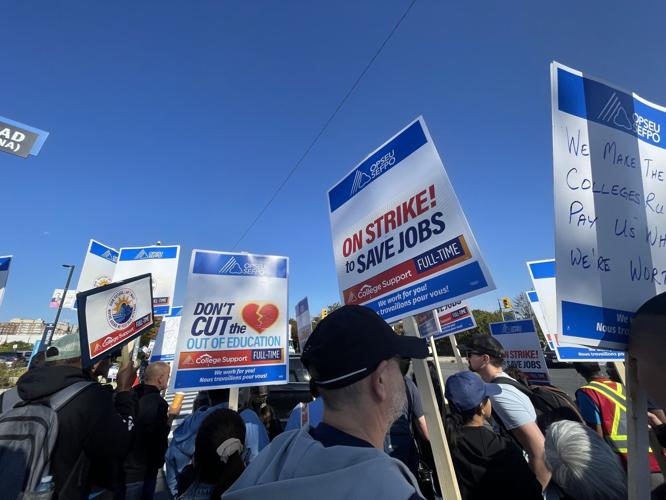Parents are taking vacation days, working from home and calling on friends and family to pitch in after the strike by Ontario’s college support staff shut down their children’s daycare centres.
Although talks between the colleges and the Ontario Public Service Employees’ Union are set to resume Friday with the help of a mediator, a group of George Brown parents say their plight has been overlooked — and they want early childhood staffers to be exempt from the job action and allowed to return to work.Â
The strike, now in its second week, has hit a number of college-run daycares across the province and impacted hundreds of families.
Not knowing how long the strike will last “is the most frustrating part of this whole thing,” º£½ÇÉçÇø¹ÙÍømom Anthy Lovachis said in an interview, stressing she is not taking sides in the labour dispute that has left her two-year-old daughter without day care.
The situation is “creating a lot of unnecessary stress and disruption,” she added. “But to have this go on just indefinitely is so unfair, and not practical for families.”
While any carve-out for child-care staff is unlikely, about 50 parents have written to George Brown, the College Employer Council (which bargains on behalf of the province’s 24 colleges) and OPSEU asking to exempt child-care workers from the strike.
Some 10,000 college support staff on Sept. 11 walked off the job, seeking improved job security as schools struggle with federal cutbacks to lucrative international students, a provincial tuition freeze and government funding they say hasn’t kept up with their costs.

OPSEU members and allies picket outside Humber College’s north campus earlier this month.Â
Nathan Bawaan/º£½ÇÉçÇø¹ÙÍøStar file photoAn OPSEU spokesperson said daycares at six colleges have been shuttered during the strike, including at George Brown, Humber and Centennial in the º£½ÇÉçÇø¹ÙÍøarea, and that staff are “fighting to keep daycare services in-house” and well-staffed.
“The employer so far has refused language on no contracting out and job security, which are necessary to continue the high-quality daycare services that our members provide,” the spokesperson said, adding the union “understands parents’ concern and empathizes with the difficult situation of daycares being affected due to strike. Our members want to get back to work.”
Council CEO Graham Lloyd said that overall, colleges have already agreed to $145 million to fund wage hikes, improved benefits and some job security, but has warned that a handful of union demands — including no layoffs, no contracting out and a ban on college mergers — are a non-starter given the schools’ precarious financial situations.
In the meantime, families are scrambling.Â
In their letter, the George Brown parents said “the most profound effects of the strike are being shouldered by infants, toddlers, and preschoolers.”
Their “education, routines, and social bonds have been entirely disrupted. They miss their teachers and their friends ... Parents are now scrambling to find care, taking unpaid leave, juggling work and caregiving, and leaning heavily on grandparents, friends, and neighbours” and it’s taking a toll, they also wrote.
Calling the situation “unacceptable,” they want the full-time daycare staff back on the job and a public acknowledgment of the hardship families have endured.Â
George Brown College said in a statement that “we understand that the closure of specific programs presents significant challenges for many families” and that it is working with Toronto’s Children’s Services “to explore alternative program options should the strike continue for an extended period.”
About 400 children under the age of four in its programs have been impacted.
Brynne Sinclair-Waters, who co-leads the Parents for Child Care network, said another group has written to the colleges and government to back the striking workers.Â
“It’s been a really stressful time for our families, but it’s really important to me to show support for our educators,” she said. “Going on strike is a tough decision to have to make and we are in this together.”
She’s shared a nanny with a neighbour, moved her two-year-old daughter to part-time child care and on Friday will move her to full-time care.Â
“For me, if going on strike is what’s needed for them to keep providing the quality care for my kids (and the community) ... then I’m behind it 100 per cent.”
For parent Isabelle Crew, surviving the strike has meant working later into the night or when her 14-month-old son is napping. While she received an exemption from her employer to work at home, “they’ve been very supportive, but I’m burning through my vacation days very quickly.”
The impact on daycares “doesn’t seem like it’s necessarily a priority for everybody, (so parents) are pushing really hard to try and get people to pay attention to the impact that this is having on our children.
“It’s been really disheartening,” she said, adding ” ... The word everybody is using is devastating.”
Error! Sorry, there was an error processing your request.
There was a problem with the recaptcha. Please try again.
You may unsubscribe at any time. By signing up, you agree to our and . This site is protected by reCAPTCHA and the Google and apply.
Want more of the latest from us? Sign up for more at our newsletter page.






















To join the conversation set a first and last name in your user profile.
Sign in or register for free to join the Conversation